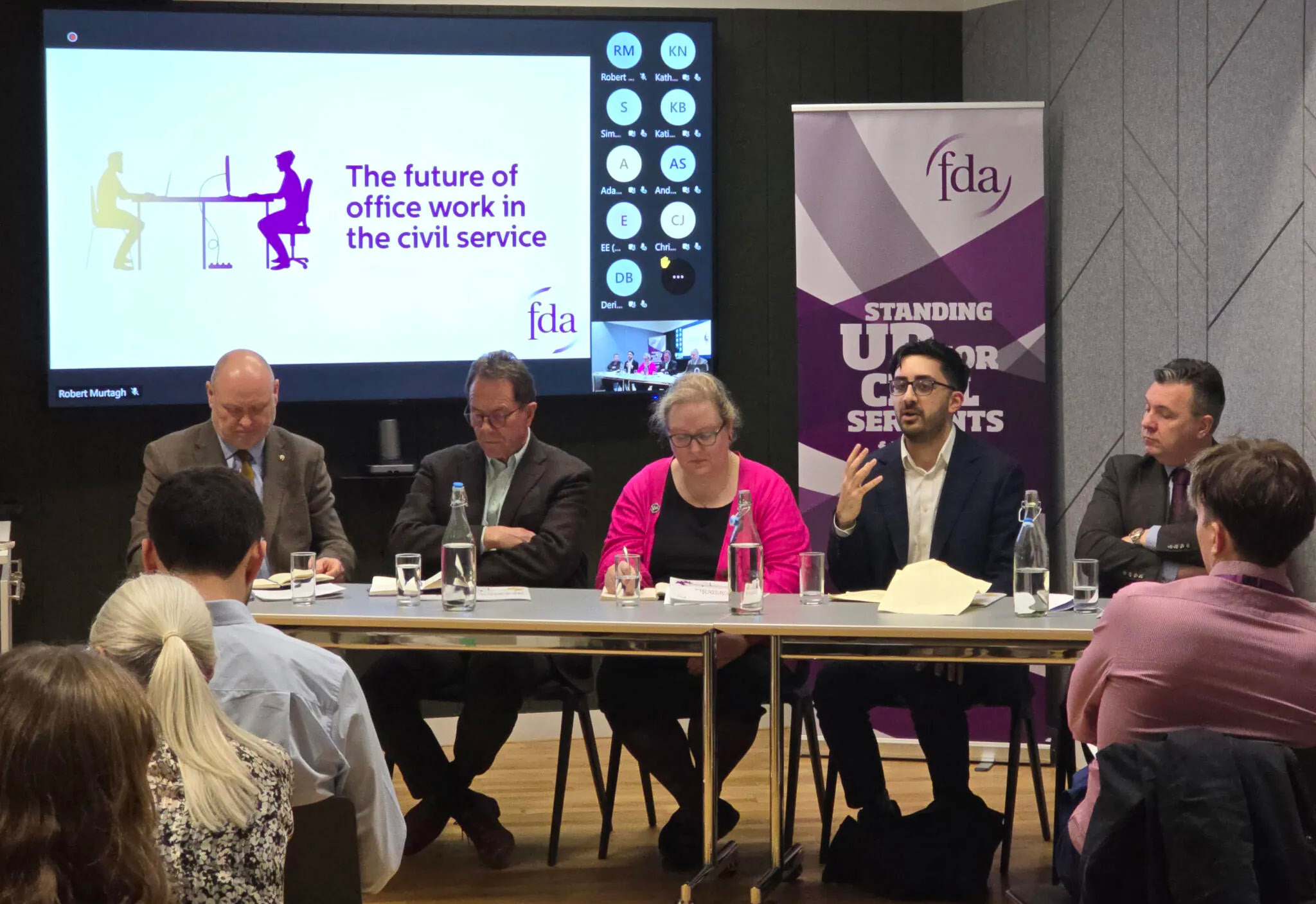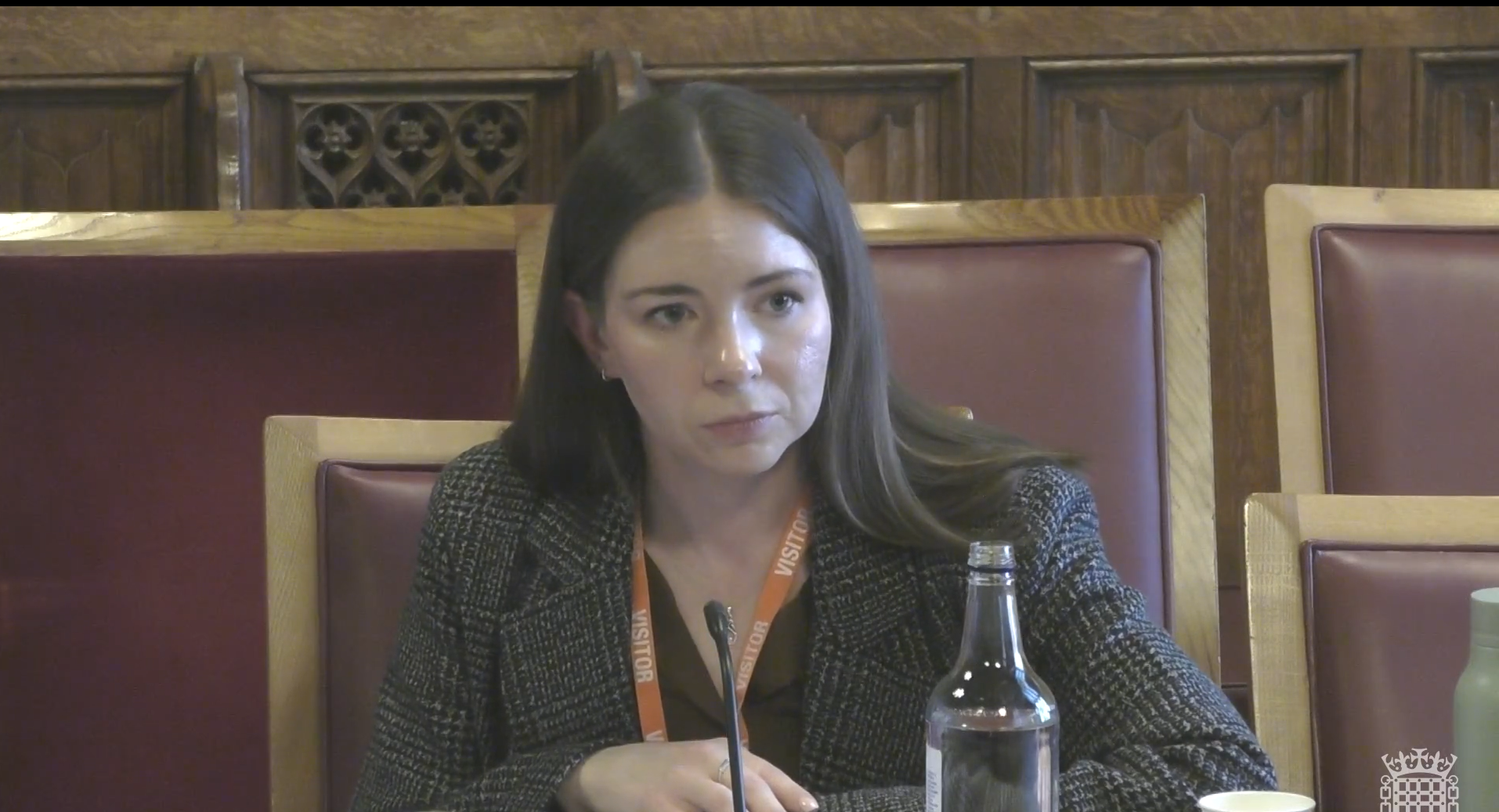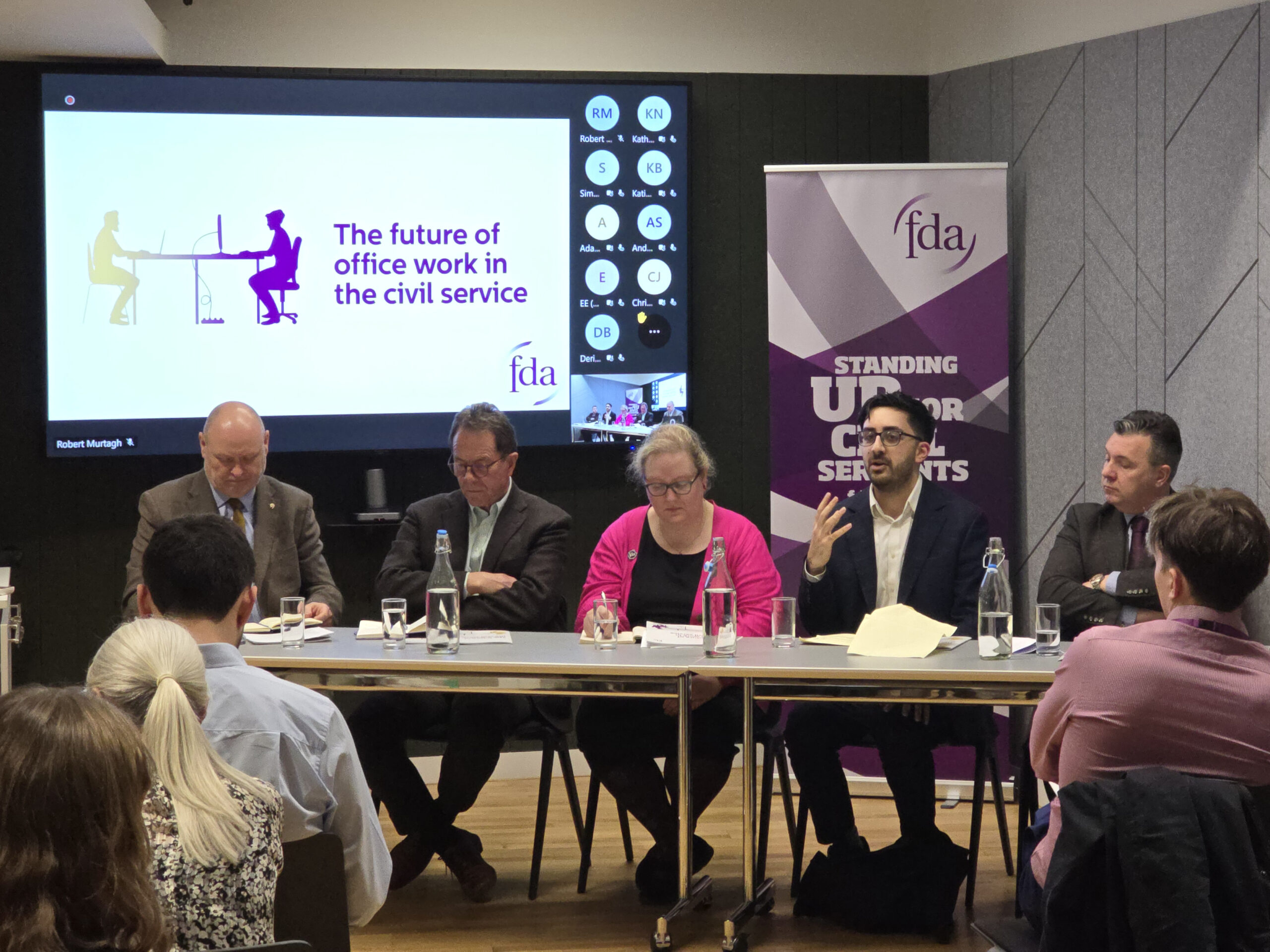Hybrid working: Led by evidence, not headlines

Tom Nathan shares the findings and recommendations of the FDA’s recent report on ‘The future of office working in the civil service’.
Civil servants have often been left frustrated by debates around office working in government departments. The issue has become politicised and is used to attack the work of the civil service, despite a lack of evidence and a detachment from the realities of civil servants’ working lives.
The FDA continues to challenges these unfair criticisms in the media, having made the case with successive governments that blanket, one-size-fits-all office attendance mandates are not an effective way of running a large and complex organisation such as the UK civil service.
In February, the FDA published a new report to move this discussion beyond the false dichotomy between productivity and office attendance, and to begin promoting purposeful office work.
‘The future of office working in the civil service’ is based on a survey of more than 7,000 FDA members, the highest response rate of any previous FDA survey. The results found that the UK government’s 60% office attendance mandate has failed to deliver on any of its own objectives.
The mandate aimed to improve collaboration and innovation, in addition to helping young workers at the beginning of their careers. However, the survey revealed that 61% respondents of those working under the 60% rule believe the mandate has decreased their productivity. 61% also reported no improvement in team collaboration due to the mandate – with members often spending the increased time in the office in virtual meetings and citing the lack of desk space. As one member put it: “Lack of available desk space means a large majority of staff cannot sit with their team members therefore the argument of being together with team members to collaborate falls down.”
The survey also provides no evidence that the mandate has benefited young workers. According to our survey, a significant 77.5% of Fast Streamers believe the mandate has not been beneficial. The only group showing notable support for the mandate were SCS workers, even then with just 30% expressing a positive view – this is still a long way off a majority.
There is also a strong scepticism among line managers that this policy has ‘managerial benefits.’ Our survey received more than 3,600 responses from employees who are line managers working under the 60% mandate – half of all respondents. 72% believe that greater office attendance has not enhanced their management responsibility and 62% believe the mandate is misaligned with the needs of their team.
This report also looked beyond the 60% mandate applied to UK government departments. The report considered the different approaches taken by devolved administrations. The Scottish Government, Welsh Government, and the Northern Ireland Civil Service have each opted not to implement a 60% office attendance mandate.
‘The future of office work in the civil service’ also looked at the integration of artificial intelligence (AI) in the civil service. Successive governments have placed hope in the potential advantages that the rapid advancement of AI holds for the performance of public services. AI promises the potential to be used to support employees by automating repetitive tasks such as data entry, email composing, speech writing, diary scheduling, managing customer inquiries, and analysis of large volumes of information. Consequentially, the future of office work with the utilisation of AI could be one area in which office work is purposeful, featuring genuine face-to-face interactions that enhance productivity and make the office a more appealing and engaging place to work.
The survey found that despite a willingness to engage with these technologies (76% of respondents are keen to gain skills in AI), their adoption remains limited, with 72% of survey respondents indicating no interaction with AI tools in the workplace.
FDA General Secretary Dave Penman said that the report findings “demonstrates that civil servants do not oppose office work”, rather “they oppose top-down blanket mandates applied to over 500,000 staff in 200 different organisations that only deliver a culture of presenteeism”.
“Civil servants want effective hybrid working arrangements where the focus is on what they do, not where they do it. They do not want a policy that’s been determined by tabloid headlines. Figuring out how best to utilise the workplace is a challenge facing many organisations. There are no easy answers. Instead, this will require serious strategic thinking.
Going forward, the union will use our evidence-based report to engage with governments on hybrid working policies. We also hope that this report can be used by reps and activists as a resource to engage with employers and colleagues on issues around office working, desk capacity, and diversity, equality, and inclusion.
Key findings from the report
- Civil servants do not oppose working in an office when it is purposeful: 69% of respondents indicated a belief that in-person working can bolster better relationship building and networking, with 59% agreeing that it can help create a stronger sense of community and belonging
- Only 11% of respondents felt the mandate had increased productivity
- 78% of respondents believe the 60% mandate overall has not been beneficial
- 32% of disabled respondents indicate that the mandate has significantly worsened their productivity, compared to 18% of non-disabled respondents
- 75% of respondents say they are spending time in the office on virtual meetings
- Only 37% of respondents feel their office work is ‘sometimes’ purposeful, while 27% said it is ‘rarely’ purposeful.
Productivity over location
In late February, the FDA hosted a panel discussion to launch the report, attended by more than 100 members, both online and in-person at the union’s Centenary House head office in London. The event was chaired by FDA President Margaret Haig and featured panellists report author Sufyan Ahmed, Chartered Institute of Personnel Development CEO Peter Cheese, Association of Higher Civil and Public Servants’ Deputy General Secretary Paul Malone, and FDA General Secretary Dave Penman.
Ahmed, who wrote the report while working as an FDA Research Intern, said his aim was “to understand firstly, what are the arrangements that people are working under, what is working, and what is not working?”. After his initial research could find no evidence to support the Cabinet Office’s 60% office mandate as the ideal number of days to spend in the office, he designed and conducted a survey of FDA members to share their experiences and their insights. Ahmed recalled how after just 24 hours the survey had over 2,000 responses – showing the strength of feeling on the subject.
Cheese, who holds a special interest in flexible working, shared insights into the practices from across the private sector, gained from his work with the CIPD – the professional body for human resources, learning and development, and organisational development with 160,000 members globally.
Cheese discussed how the economy was already moving towards remote working before COVID – the pandemic just accelerated and normalised it. He highlighted that he was co-chairing a flexible working task force with the former Department for Business, Energy, and Industrial Strategy (now Department for Business and Trade), which was established about four years before the COVID crisis with the intent to encourage more businesses to support flexible work.
According to Cheese, “the real question” is this: “Has [hybrid working] affected your output or your productivity?”
He added: “I think a lot of this comes from some very entrenched thinking… it has been politicised as well… I think [what] we’ve all learned from this is we’ve got to do a better job of training managers… they’ve got to understand, ‘how do I measure the output that somebody’s creating and not just judge them by how many hours they’re sat in front of it on a screen?’”
Malone began by telling attendees that “the responses that you’ve received from FDA members very much resonate with our experience in Ireland. But I think there are some differences in the way hybrid working is structured.” He added that, as in the UK, hybrid working is used by media and certain politicians as “a stick to beat” Irish civil servants with.
When a framework for hybrid working in the Irish civil service was produced in 2022, Malone said that “one of the key points of agreement in that particular framework is that it wasn’t a one size fits all approach. The framework set out parameters and principles and then it was up to each civil service organization to develop its own policy,” he explained.
Malone said that AHCPS also “made sure to stitch in that local consultation with staff representatives was a requirement in the development of the policy”, which “made sense for their own business situation.” He explained how this impacts current office attendance in the Irish civil service, ranging from 5 days a week in office to 1 depending on the role’s needs.
When seeking a change to a policy, employers must root any decisions in evidence and data, using 30 or 40 metrics including “performance data, absence data, probation data, induction data, exit interview data, customer stakeholder satisfaction surveys, employee engagement metrics, [and] governance and employee metrics”.
Penman set out the strategic thinking hybrid working requires for the union and the civil service : “We became very defensive about civil service being attacked for hybrid working, rather than actually being able to engage in a meaningful discussion of what is the right solution and what are the big HR challenges that come from hybrid working approach”.
Penman argued there is a huge prize for getting hybrid working right, including higher productivity and delivering for the public. This report looks at “how do organisations work and how can hybrid working be fruitful for them in terms of efficiencies or civil service reducing costs”, and he hopes it can start an evidence-led conversation on office working.
Recommendations for the future of office work
The report uses these survey responses to make recommendations for an evidence-led approach to office work in the civil service:
- Comprehensive review of the 60% mandate: This review should be carried out with a view to creating a more flexible approach which takes into account whether a piece of work can be best completed in person or remotely, rather than a blanket mandate.
- Equality Impact Assessment for under-represented civil servants: It is imperative that all civil servants can fulfil their potential and this requires a flexible approach, not a top-down mandate.
- Purposeful office use: Promotion of ‘purposeful office use’, with a view to ending the ‘culture of presenteeism’ and ensuring that when employees are in the office, it is for activities improved by in-person presence
- Departmental building assessments: The survey shows that there are significant issues regarding building capacity and availability of meeting spaces and other equipment needed to support modern ways of working.
Latest news
-

Office attendance mandate “doesn’t make sense”, Crowley tells House of Lords Home-based Working Committee
FDA Assistant General Secretary Lauren Crowley gave oral evidence to the House of Lords Home-based Working Committee for its inquiry on remote and hybrid working.
-

The future of office work in the civil service report launch
Report author Sufyan Ahmed, CIPD CEO Peter Cheese, AHCPS Deputy General Secretary Paul Malone, and FDA General Secretary Dave Penman discussed the FDA’s findings that 78% of civil servants believe office attendance mandate has failed.
-

“No rationale” for ordering civil servants back to office
General Secretary Dave Penman has said ministers’ “obsession with ending flexible working and micro-managing the civil service increasingly just looks vindictive”, after Jacob Rees-Mogg called for an end to civil servants working from home.